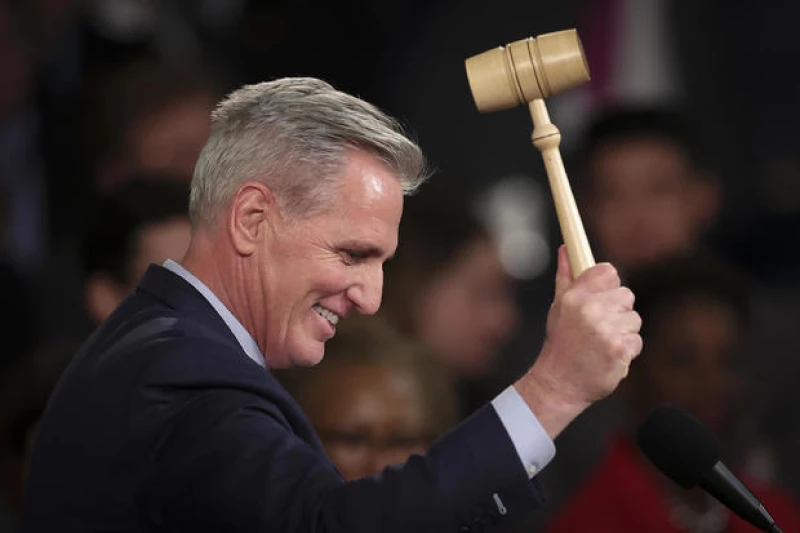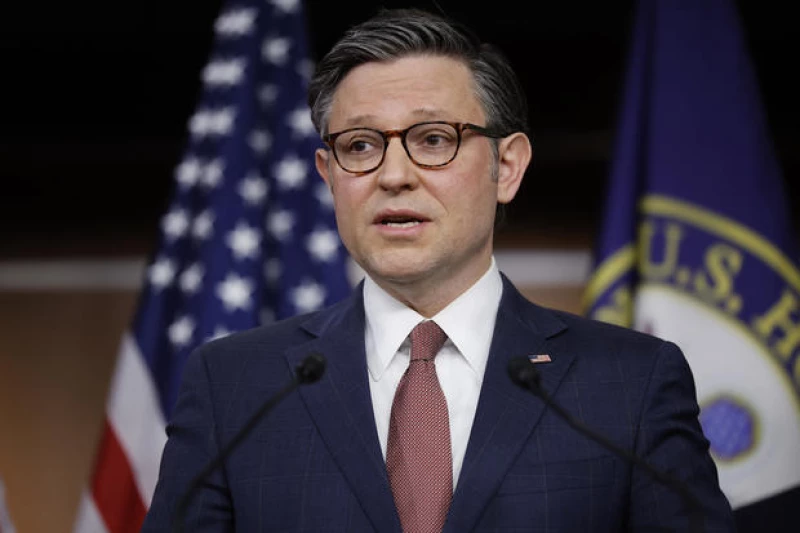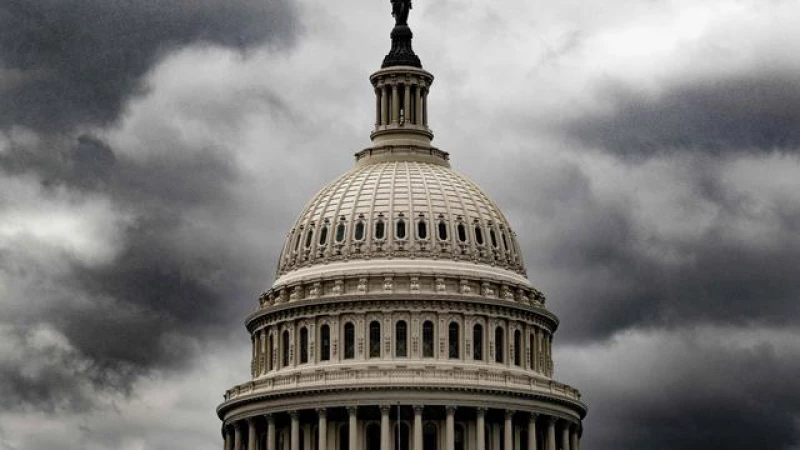Government Funding Fight Resolved, But Another Looms Ahead
Last month, lawmakers in Congress finally resolved a funding fight that had stretched on for months, approving two separate bills to keep the government open and avoid a shutdown that would have had dire economic consequences.
And they did it just in time to start the process all over again. The funding packages will keep the lights on for the rest of the fiscal year, which is already halfway over.
A delay in approving annual spending bills is nothing new in Washington. In 2022 and 2018, the process also stretched into March. In 2017, it wasn't resolved until May.
But this time around, many Republican lawmakers in the House made a concerted effort to do things differently. Fresh off capturing the chamber in the 2022 midterm elections, Rep. Kevin McCarthy agreed to demands by a small group of hard-right conservatives who wanted lawmakers to limit spending and take up funding bills individually. McCarthy won the speakership when he agreed, only to lose the job months later when he abandoned that approach as it collided with the realities of governing.
Following a series of attempts to revamp the appropriations process, a deadline was set for April to pass full-year spending bills or face across-the-board cuts. Additionally, an effort was made to split the massive spending package into two separate pieces of legislation, deviating from the usual approach favored by conservatives.
These moves aimed to break away from the typical funding pattern in Congress, which involves approving government spending in omnibus bills, often rushed through before holiday breaks, leaving little time for thorough review by lawmakers.
However, despite these efforts to bring about change, the final spending package swiftly passed through Congress within 48 hours of its introduction, as legislators were eager to adjourn for a two-week recess. Ultimately, the funding process for the government remained largely unchanged, with little indication of significant alterations in the future.
Reflecting on the outcome, Sen. Patty Murray, the leading Democratic appropriator in the Senate, questioned the effectiveness of the delays, stating, "After all of that delay, how different ultimately was the outcome? We are here, six months into the fiscal year, and agencies will just have six months left to leverage these full-year spending bills."
How does the budget process unfold?
According to the Constitution, the federal government's spending must be approved by Congress. The process begins with bills originating in the House, passing through the Senate, and finally being signed by the president before funds can be utilized by departments and agencies.
The Congressional Budget and Impoundment Control Act of 1974 outlines the steps for approving spending bills for departments and agencies prior to the start of the fiscal year on Oct. 1. The president is required to present a budget to Congress by the first Monday of February, detailing the funding needed by the executive branch for the upcoming year.
Subsequently, the House and Senate budget committees are expected to pass a budget resolution by mid-April. In mid-May, the House should commence the consideration of the appropriations bills. The House is anticipated to complete the process by the end of June, as per the Congressional Research Service.
However, the actual execution rarely aligns with the intended timeline.
"Congress has developed a budget process over time through a variety of statutes, rules, practices, and precedents. Collectively, these elements constitute a complex process involving numerous decisions and actions that may occur at different points throughout the year," states a CRS report from July. The report also highlights that "there is no single timeline" to accurately forecast when each phase of the process will transpire annually.
Over the past few decades, Congress has rarely adhered to its appropriations timeline. Since 1996, data from the Pew Research Center shows that Congress has not passed more than five of its 12 appropriations bills on time. Instead, they often resort to continuing resolutions to extend funding, eventually resorting to omnibus packages to secure government funding. A government shutdown occurs when spending authority expires without an extension or a new bill.
Omnibus packages are favored by lawmakers because they can encompass policies or programs that might not pass if considered individually. Both political parties have utilized this strategy to their benefit, using the threat of a shutdown to pass extensive spending bills with their desired provisions attached.
Shutdowns are something lawmakers strive to avoid due to their economic and political repercussions. The most recent funding gap, lasting from December 2018 to January 2019, resulted in a permanent loss of approximately $3 billion, as per a Congressional Budget Office report. Even the mere possibility of a shutdown elicits strong reactions from voters, reflecting the dysfunction it symbolizes. Congress' approval rating plummeted to a near-record low of 13% in October, according to Pew. In December 2018, the approval rating hit 9%.
Conversely, the reluctance to shut down the government provides leverage to those in secure districts who aim to secure concessions. Some conservatives have even suggested that a shutdown would not be as detrimental.
"I'm not afraid of a shutdown," remarked Rep. Chip Roy, a Texas Republican, during a news conference shortly before Congress reached an agreement to fund the government, dismissing a shutdown as a "swamp" excuse.
How Republicans tried to do things differently

Opposition from House conservatives, who pushed to consider individual bills and cut overall spending, was the key factor that delayed passage of this year's funding packages.
The dynamic began at the start of the new Congress. When House Republicans took control of the chamber in January 2023 after their victories in the midterm elections, they vowed to reform the appropriations process. And after a bruising 15-round speaker election, McCarthy was selected to lead the chamber. He pledged to "end wasteful Washington spending" and made several concessions to a group of conservatives, who would go on to wield outsized influence on the California Republican's tenure.
The spending fight came to the fore as a deadline to raise the debt ceiling approached last summer. The debt ceiling limits how much the government can borrow to fulfill its spending obligations, and is separate from appropriations bills, which set the funding levels.
McCarthy considered using the deadline as an opportunity to, as he put it, "examine our nation's finances" and cap spending at the previous year's levels, in accordance with the deal he made with his conservative members. But he ultimately reached a deal with the White House last May to lift the debt ceiling without extracting major spending cuts. The two sides also agreed on a topline funding level for the coming fiscal year.
House conservatives were outraged, saying McCarthy had violated their agreement. They halted legislative work on the House floor in a rare protest that dragged on for days. By the next week, McCarthy had relented. House appropriators abruptly reversed course, agreeing to mark up spending bills at lower levels. The shift led to a monthslong back and forth between the House and Senate that effectively stalled the funding process.
As the start of the new fiscal year approached, the House and Senate remained far apart on their plans to avert a shutdown. With just hours to find a solution at the end of September, McCarthy defied House conservatives to bring up a short-term funding extension, successfully avoiding a shutdown with the help of Democrats.
Days later, eight House conservatives voted to oust McCarthy from his post, arguing that he had reneged on the commitments he made at the start of the Congress. With McCarthy out, it took weeks for the GOP conference to elect a new speaker, further delaying appropriations work.

At the end of October, House Republicans finally settled on Speaker Mike Johnson, a little-known member from Louisiana whom conservatives saw as one of their own, to lead the chamber. Weary from the spending fight and lengthy speaker battle, conservatives granted him more leeway to find a way to fund the government.
Johnson soon proposed a two-step approach to extend the funding deadline past the winter holidays and give lawmakers more time to pursue individual spending bills. But Republicans were unable to reach agreement on a number of them, forcing the speaker to reach across the aisle to push off those deadlines yet again.
In the end, Johnson reached a deal with Democrats that largely mirrored what McCarthy had agreed to months earlier. Instead of one large spending bill, the funding was split into two packages, keeping the government open until October.
Despite the chaos and vows to change things, when the dust settled, Congress largely stuck to its usual ways, much to the chagrin of Republicans who came to Washington vowing to change things.
"When I first came to Congress, I was warned that this is how this town operates," Rep. Eric Burlison, a Missouri Republican said at a House Freedom Caucus news conference last month. "But I had a glimmer of hope, that we had the majority, that we had enough people that were fiscally sane, and that this time it would be different. Unfortunately it's not different."
Rep. Matt Rosendale, a Montana Republican, said the House conservatives had fought "extremely" hard to reform the process in the lower chamber on spending and beyond, saying that "everyone recognizes that this place is broke, that this system is broke."
Rosendale pointed to the House's 72-hour rule, which grants lawmakers the time to review legislation after it's unveiled. He pointed to the effort to bring single-subject legislation to the floor along with an open rule process that would guarantee debate and amendments on the House floor.
Reform efforts and what comes next

Despite the effort for reform, the policies and spending levels pushed by the House conservatives had next to no realistic chance in the Democratic-controlled Senate, giving House leadership little choice but to abandon the push, even with the outsized influence wielded by the conference's right flank. But that didn't quell conservative frustrations.
"We had a stronger hand a year ago and we should have played that hand," Good said last month. "If we'd played that hand appropriately we wouldn't be where we are today, we wouldn't have a new speaker, quite frankly."
For the conservative lawmakers, who largely hail from safe districts, pressing for extreme cuts or policies — even if it risked shutting down the government — came with little risk and a potentially high reward of achieving some of their policy goals. That dynamic has not changed.
"If you surrender, you lose every time," said Rep. Andy Biggs, an Arizona Republican. "But if you fight, you've got a chance to win once in a while at least."
Following the approval of the funding package by lawmakers, there seems to be a general dissatisfaction with the current process in Congress. Rep. Robert Aderholt, a Republican from Alabama, who serves on the House Appropriations Committee, has suggested delaying the selection of a new committee chair in favor of focusing on reforming how spending bills are created.
In a recent interview with CBS News, Aderholt expressed his concerns about the current state of affairs, noting that when he first entered Congress over twenty years ago, appropriations bills were handled differently. He highlighted the increase in partisan conflicts and the use of omnibus packages as contributing factors to the current issues.
Aderholt emphasized the need to address the division within Congress and restore pride in the appropriations process. He stated, "I'd like for us to come back to the day where members are actually very proud of what's in the appropriation bill and know that they have had a hand in it, no matter who they are."
The Alabama Republican, who had expressed interest in leading the committee but never officially launched a bid, has proposed a handful of reforms — from moving toward zero-based budgeting and empowering authorizers to involve more members in the process, to creating thresholds of support for bill riders and earmarks to be considered.
"Every member that I've talked to, whether it be rank-and-file members, whether it be other chairmen, whether it be steering committee members, they acknowledge that there are some real problems with the appropriations process, and that we've got to make some real changes," Aderholt said. "And if we don't, I think everybody fears we're all going to end up in the same place that we were this last time."
The Republican Steering Committee on Tuesday selected Rep. Tom Cole, the House Appropriations Committee vice chairman, to fill Granger's seat as the House GOP's top appropriator. Aderholt made clear that he's hoping to work with Cole on a path forward with the possible reforms.
"I think he knows there needs to be a lot of changes as well. And so you know, I'm offering these up as trying to work with him to try to figure out a path forward in this," Aderholt said. "Anybody on the appropriations committee, and certainly the chairman, wants to see a bill that can easily go through the House or the Senate, and I think this process makes it more easy."
Anticipating the upcoming deadline to fund the government by the end of September, the appropriations process is already lagging behind the schedule set forth in the Budget Control Act. Instead of unveiling his budget proposal on the first Monday of February, President Biden presented it in March.
Several other factors loom that could further impede the process. Lawmakers will be harder to reach this fall as the election season ramps up, diverting attention from appropriations work. Additionally, the impending election may make lawmakers hesitant to approve spending bills before any potential shift in party control of the House, Senate, and White House.
Looking ahead to future funding battles, Murray, the Democratic appropriations chair in the Senate, stressed the importance of drawing lessons from the challenges of the past few months in navigating divided government.
"We have the ability to craft bipartisan bills," she remarked. "However, when House Republicans halt progress to renegotiate agreements with the president, push for partisan measures, and heed the voices of the extreme right, it squanders valuable time that could be better spent on developing legislation to boost our economy, safeguard our nation, and improve the lives of our constituents."







